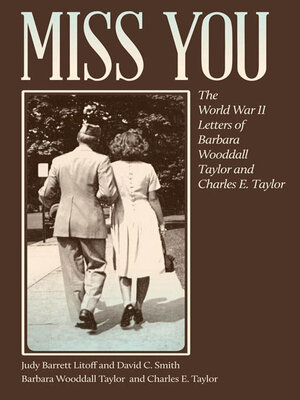Miss You
ebook ∣ The World War II Letters of Barbara Wooddall Taylor and Charles E. Taylor
By Judy Barrett Litoff

Sign up to save your library
With an OverDrive account, you can save your favorite libraries for at-a-glance information about availability. Find out more about OverDrive accounts.
Find this title in Libby, the library reading app by OverDrive.



Search for a digital library with this title
Title found at these libraries:
| Library Name | Distance |
|---|---|
| Loading... |
Experience World War II from the perspective of a married couple in this collection of letters exchanged between an American serviceman and his wife.
During World War II, the millions of letters American servicemen exchanged with their wives and sweethearts were a lifeline, a vital way of sustaining morale on both fronts. Intimate and poignant, Miss You offers a rich selection from the correspondence of one such couple, revealing their longings, affection, hopes, and fears and affording a privileged look at how ordinary people lived through the upheavals of the last century’s greatest conflict.
“In Fairburn, Georgia, when I was growing up, everyone knew them simply as “CharlieandBarbara,” one word―for they seemed almost uncannily close, a single unit of harmony, two parts of a whole. Now everyone who reads this extraordinary document of love in a time of war will feel the power of that closeness. Miss You is the quintessential American chronicle…. Read and cherish it―there are none of us who wouldn’t have chosen for ourselves such a love as this.”—Anne Rivers Siddons, New York Times–bestselling author of Peachtree Road
“A volume that offers extraordinary insight into the daily experiences of Americans at war.”—Georgia Historical Quarterly
“Their great love―the connecting theme of this wonderful book―is something so rare it is both beautiful and ennobling.”—Atlanta Journal-Constitution
“It is the insight gained by reading these letters that make this book exceptional…. By the book’s close, the reader has gained an intimate and truthful understanding of wartime psyche and feels deeply how crucial these letters were to those they were comforting.”—Hannah M. Jocelyn, Southern Historian







